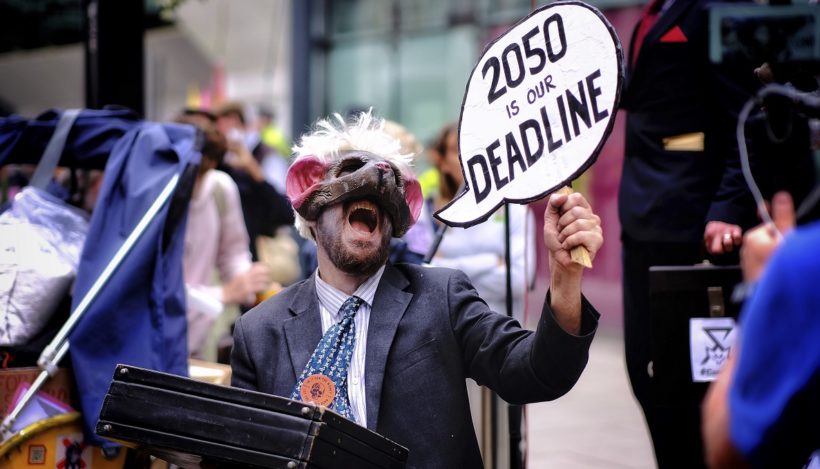From Glasgow-Scotland, where COP 26 is taking place, Pressenza’s programme Cuatro Elementos interviewed Melissa Moreano, professor and researcher at the Universidad Andina Simón Bolívar-Ecuador, member of the collective Geografía Crítica-Ecuador and the Latin American and Caribbean Platform for Climate Justice.
Q: Let’s start by reminding our readers what the COP is all about and in what situation we arrive at COP 26?
MM: The COP is the acronym for the Conference of the Parties. The parties are the countries that signed the United Nations Framework Convention on Climate Change back in the 1990s when the alarm bells rang about the deterioration of the atmosphere caused by climate change. At that time, countries committed themselves to a shared but differentiated fight against climate change. At that time there was a recognition that not all countries were equally responsible for what was happening: the industrialised countries called the Global North were singled out as the ones most responsible for having been polluting since the Industrial Revolution and those of us called the Global South had not contributed to the problem, but were going to take the brunt of the impacts.
So, the supreme body that governs this Convention is the COP and this is the 26th, that is, they have been meeting for that number of years, reaching agreements, but not the necessary agreements that are of interest to us in order to solve the problem. This COP is important because it comes after global containment, when it was proven that with containment greenhouse gas emissions fell dramatically and many voices were raised showing that it was possible to stop production for a while with a positive impact on the planet. It is also important because since COP 21, where the new global agreement, called the Paris Agreement, was written, work has been done on the regulation to implement what was written in that agreement.
Q: One thing is that insufficient agreements are reached and another thing is that even those agreements are fulfilled. Are there binding commitments at this COP 26?
MM: The binding agreement is the Paris Agreement, which was ratified by all countries and replaced the Kyoto Protocol, establishing a fundamental shift in climate governance. The Protocol set an emission limit for countries, a specific percentage of their emissions in the previous year. Paris turned that around because it wasn’t working and established the concept of “climate ambition”. Each country commits to reduce emissions and take adaptation actions and produces a document called Nationally Determined Contributions (NDCs). What is happening is that these contributions are very unambitious.
Q: What is your assessment of the commitments that are being made?
MM: The first big issue that is being negotiated is how often countries are going to report on their achievements. Why? Because the research centres have affirmed that with the commitments that are being offered, we will easily pass the 3 degrees of temperature increase and that it is essential to establish a maximum period of three years and not every five years for each country to report so that it is possible to increase their commitments.
The other issue that is being discussed behind closed doors (a special feature of this COP, with the argument of biosafety measures), and it is a very serious issue, is how the market mechanisms are going to work. The Paris Agreement established that the fight against climate change requires the intervention of the capitalist market, that states cannot do it alone and that the market must regulate. This has been done since the 1990s and it has not worked. The only thing it does is to create carbon credits that serve for countries to “compensate” for not reducing emissions, that is, they justify pollution with those credits that allow them to continue polluting by sending that money to hydroelectric projects in Singapore or a forest conservation project in Ecuador. In other words, there are money transactions, but no emission reductions. Social organisations are calling for these mechanisms to be scrapped, but this is not happening. Now they call them “cooperative agreements”.
Q: At the same time, we have seen images of large mobilisations and many young people in the streets. Do you think we have made progress in raising awareness, in joining forces, in mobilisation, even though so far not much has been achieved? How do you assess this?
MM: There is a large presence of teenagers who are no longer buying into these discourses. In Europe, the climate issue is generating a lot of interest. There is a generation that is going to turn the tables on this issue. On the other hand, people are getting tired and realising that the COP is going nowhere. In the streets of Glasgow there are posters reading “the planet killers are meeting”. Parallel to the COPs there is always the People’s Summit or Alter Summit and there the central point is precisely that the COPs do not work and will not work. It is necessary to go down other paths, it is argued. There is frustration, anger and mistrust.
An important polarisation is taking place: the COP is full of corporations lobbying and outside there is a strong mobilisation, this time with around 150,000 people, despite all the restrictions on arrival that prevented many people from getting there. Even so, there is a very large presence of indigenous peoples, in fact 100 people from the Indigenous Minga of the Amazonian countries and a very good representation of Amazonian women. All this gives a breath of fresh air and opens up hope despite all the technicalities intended to prevent people from understanding what is at stake.










